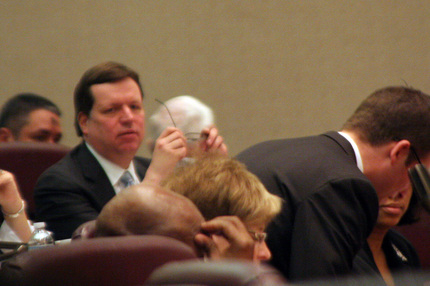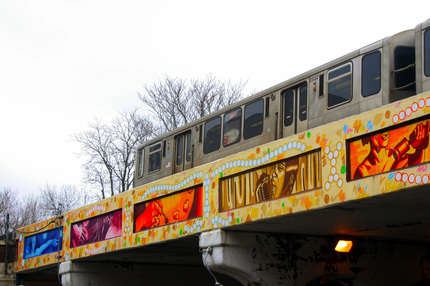| « Chicago Youth Come Out as "Undocumented, Unafraid, and Unapologetic" | Learning from a Japanese Sister City » |
Good Government/Reform Mon Mar 14 2011
Time for Participatory Budgeting to Grow?
This article was submitted by Austin Smith.
In most communities, residents who see the need for an infrastructure project must send letters, make phone calls and attend meetings. In the 49th Ward, they simply need to vote.
The North Side neighborhood uses a process known as participatory budgeting, which puts the fund allocation decisions in the hands of the community itself.
In 2007, Ald. Joe Moore first learned about the concept from a presentation by Josh Lerner, director of the Participatory Budgeting Project. Over the next few years Moore further researched the potential to use the process for city funds known as menu money. In fiscal 2010, his ward became the first jurisdiction in the United States to implement participatory budgeting.
Each ward receives the same amount of menu money, last year that amount was about $1.3 million, and it can be used for any infrastructure projects the Alderman's office chooses. Ald. Moore created a four-step election process whereby any resident who is 16-years-old or older can propose and ultimately vote for expenditures, regardless of citizenship or voting eligibility.
Maria Hadden, associate with the PB project and Rogers Park resident, said her organization helped with the logistics of creating the program. "It is something new, a more formal way to get people involved," she said. "Our plan is to allow participatory budgeting to expand," Hadden said. She said the PB project and Ald. Moore's office both intend to help other wards follow the 49th Ward's footsteps.
Just as the PB project hoped, the concept appears to be gaining popularity.
Eight aldermanic candidates who made campaign pledges to implement participatory budgeting won their races and 6 others are in runoff elections on April 5.
"The greatest benefit is that it encourages people to be mobilized and interact with their government," said David Merriman, head of the economics department and professor of public policy at UIC. He said the program's transparency is effective, but he foresees some challenges.
"The danger is that the most articulate people in the community are the most effective in this type of thing, and are likely to get their needs met while people who are less educated or less involved might not," Merriman said. "But democracy is imperfect."
The program is popular, but not all residents see it as the best solution.
"It is not a formal process. It is sort of an ad hoc process with rules made up by the alderman," local attorney Kurt Fujio said. "It has no laws, and it allows children to vote."
Fujio said that he sees value in getting the community involved in decision-making, but he expressed concerns regarding diverse representation.
Luis Klein, Ald. Moore's participatory budgeting assistant, defended the process and its flexibility.
"Could we do better? Absolutely, you can always have a more diverse group of opinions," he said. "We will constantly adapt, evolve and move forward."
Hadden, who's also a graduate student at Loyola University, pointed out that in years prior to the implementation of participatory budgeting, the alderman's office typically received fewer than 50 suggestions from the community for spending menu money. In the first year of the program, more than 1600 people voiced their opinions by voting.
Upon reviewing the results of the 2010 participatory budgeting vote, Ald. Moore's office and some community members noticed a flaw. Street resurfacing projects were proposed on a block-specific basis, so each one received votes only from residents near that block. The result was that very few blocks were approved for resurfacing.
To address this issue some residents came up with a plan, whereby the 2011 ballot will ask what percent of total funds should go to street resurfacing projects. The average of those responses will be allocated to street resurfacing and a committee of residents will decide which blocks are most in need.
Klein said that although this adjustment manipulates the process, it maintains the community-driven spirit of participatory budgeting.
In addition to spreading throughout Chicago, the PB project website says that municipalities in New York have expressed interest in the concept.
After several years of popularity in parts of South America and Europe, participatory budgeting is now gaining momentum here in the United States. Will it continue to do so?
After growing up in the Chicago area, Austin ventured west to Montana for college. During his five years as an undergrad, most of his time was spent tumbling down the slopes at the local mountain, Snowbowl. Glad to be back in the midwest, he is a graduate student at Northwestern's Medill School of Journalism. He can be reached here.















Luis Klein / March 14, 2011 5:30 PM
I just want to clarify one point made by Mr. Fujio. The rules of the process were not made by Alderman Moore, instead the Alderman invited community leaders and activists to form a steering committee who's purpose was to establish the rules that would govern the process. A list of those who participated is available here http://participatorybudgeting49.wordpress.com/about/2010-steering-committee/.
Luis Klein
Participatory Budgeting Assistant to Alderman Joe Moore